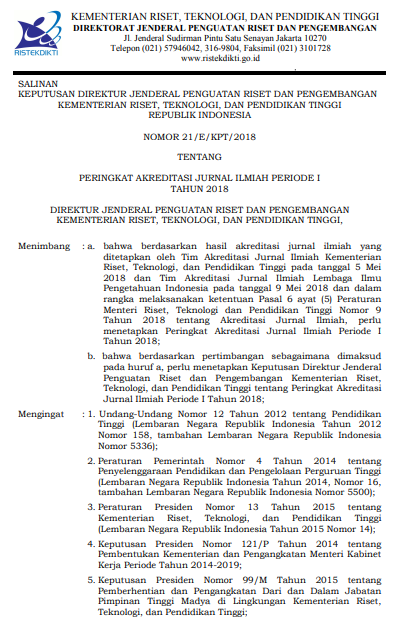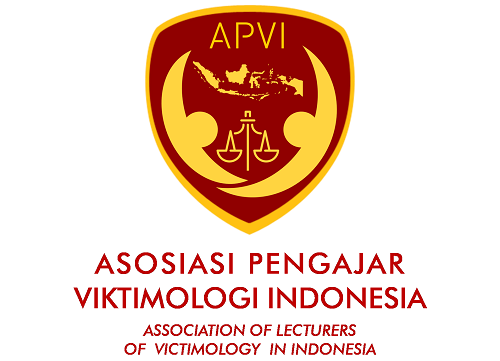The Effectiveness of the Revitalization of Correctional Services in the Development of Terrorist Prisoners
Abstract
Terrorist prisoners are characterized by the nature of radicalism that can endanger the existence of the Indonesian state. For this reason, while serving their prison sentences they are treated to a coaching program aimed at deradicalization. Concerning optimizing the development of prisoners, there are provisions of the Regulation of the Minister of Law and Human Rights Number 35 of 2018 concerning the Revitalization of Correctional Services. The revitalization of the implementation of the requirement is intended to improve the implementation of correctional duties and functions. This research is the first problem, how is the effectiveness of the revitalization of prisons in the development of terrorist prisoners, and the second is the factors that become obstacles in the effectiveness of the revitalization of coaching of terrorist prisoners. Research methods with a sociological juridical approach method, data in the form of primary data and secondary data taken from research locations at the Cipinang Jakarta Prison, Cirebon Prison, and Batu Malang Correctional Institution. Data analysis using qualitative analysis. The results of the study found that the revitalization of correctional services in the development of terrorist prisoners have not been effective because there has not been a complete creation of deradicalization. Obstacles to the effectiveness of the revitalization of coaching of terrorist prisoners are the legal structure factor and the legal cultural factor in terrorist prisoners. For ordinary prisoner coaches who are assigned the task of fostering terrorist prisoners (deradicalization), it is necessary to provide education and training on profiling and assessment of terrorist prisoners.
Keywords:Deradicalization; Terrorist Prisoners; Revitalization
Full Text:
PDF View
References
Firdaus, Insan. (2017. Penempatan Narapidana Teroris DiLembaga Pemasyarakatan (Putting Convicted Terrorists in Correctional Institution), Jurnal Penelitian Hukum DE JURE, ISSN 1410-5632. 17 (4). 430
Gunakarya, Widiana Gunakarya.(2008). Sejarah dan Konsepsi Pemasyarakatan. Bandung: Armico.
Indonesia. (2015). Keputusan Direktur Jenderal Pemasyarakatan Kementerian Hukum dan Hak Asasi Manusia Republik Indonesia No. PAS172.PK.01.06.01 Tahun 2015 tentang Standar Pembinaan Narapidana Teroris.
Indonesia.(2018). Peraturan Menteri Hukum Dan Hak Asasi Manusia Republik Indonesia Nomor 35 Tahun 2018 Tentang Revitalisasi Penyelenggaraan Pemasyarakatan.
Kadiyono. (2022). Pembinaan Narapidana Teroris di Lembaga Pemasyarakatan Kelas 1 Cirebon. Cirebon: Lembaga Pemasyarakatan Cirebon.
Nugroho, Trisapto Wahyudi Agung. (2020). Peran Pembimbing Kemasyarakatan Dalam Rangka Mendukung Revitalisasi Penyelenggaraan Pemasyarakatan (Probation Officers Roles In Order To Support The Correctional Revitalization). Jurnal Ilmiah Kebijakan Hukum. 14 (3). 446
Prabowo, Yudha Cahyo. (2020). Perlakuan Terhadap Narapidana Terorisme Risiko Tinggi di Lembaga Pemasyarakatan Super Maximum Security. Jurnal Gema Keadilan (ISSN: 0852-011).7(2). 99.
Salas, Andhika Yovaldi. & Umar Anwar. (2021). Pembinaan Narapidana Terorisme dalam Upaya Deradikalisasi di Lembaga Pemasyarakatan Super Maximum Security. Journal of Correctional Issues. 4 (1). 33-45
Sentosa, Adi Sentosa. (2022). Pembinaan Narapidana teroris di Lembaga Pemasyarakatan Kelas 1 Batu Malang. Malang: Lembaga Pemasyarakatan Batu Malang.
Suherman, Ade Maman. (2004). Pengantar Perbandingan Sistem Hukum. Jakarta: Raja Grafindo Persada.
Sufianto, Hijrah. (2022). Pembinaan Narapidana Teroris Lembaga Pemasyarakatan Kelas 1 Cipinang Jakarta). Jakarta: Lembaga Pemasyarakatan Cipinang Jakarta.
Tobing , Kesita Eva Lestina Lumban. Madiasa Ablisar. M. Hamdan. M. Ekaputra. (2019). Pembinaan Terhadap Narapidana Di Lembaga Pemasyarakatan Kelas IIA Pematang Siantar,” USU Law Journal 7 (5). 56-62. Retrieved Agustus 12, 2022 from http://download.garuda.kemdikbud.go.id/article.php?article=1424051&val=4099&title=Pelaksanaan%20Pembinaan%20Terhadap%20Narapidana%20di%20Lembaga%20Pematang.
Usman, Sabian. (2009). Dasar-Dasar Sosiologi. Yogyakarta: Pustaka Belajar.
Warassih, Esmi. (2005). Pranata Hukum Sebuah Telaah Sosiologis. Semarang: PT Suryandaru Utama.
Wijaya, Amin Tunggal. (1993). Manajemen Suatu Pengantar Cetakan Pertama. Jakarta: Rineka Cipta Jaya.
Yuliyanto, Donny Michael, Penny Naluria Utami. (2021). Deradikalisasi Narapidana Teroris Melalui Individual Treatment (Deradicalization Of Terrorist Prisoners Through Individual Treatment) Jurnal HAM. 12 (2). 195.
DOI: http://dx.doi.org/10.20884/1.jdh.2022.22.3.3355
Refbacks
- There are currently no refbacks.
JURNAL DINAMIKA HUKUM Indexed by :
 | Jurnal Dinamika Hukum | |
| Faculty of Law, Universitas Jenderal Soedirman | Copyright of Jurnal Dinamika Hukum | |
| Yustisia IV Building, Law Journal Center | ISSN 2407-6562 (Online) ISSN 1410-0797 (Print) | |
| Purwokerto, Central Java, Indonesia, 53122 | JDH is licensed under a Creative Commons Attribution 4.0 International License | |






